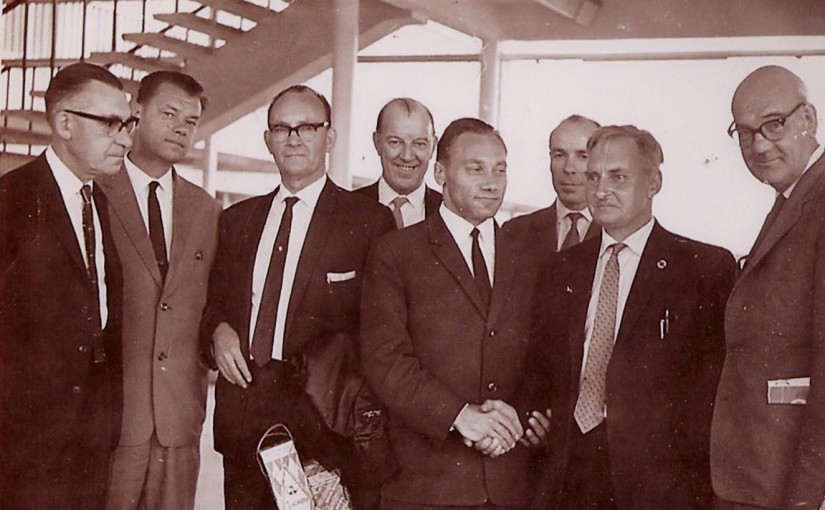Part Two
By Arthur Woodgate
From Leningrad we flew into Vilna, the capital of Lithuania it was dark when we reached the Lithuanian Capital because it is a long South and West from Northern Russia, and flying over the lit up city was a grand sight. I had never seen a lit up City from the air before, and as the Soviets called all their cities jewel, it gave me something to start off a speech with and get them smiling. The builders committee of Vilna were very friendly and took us off to various places as well visiting their building sites. Most of them could speak good English but wouldn’t in public and our interpreter had to go through the motions of spouting out all three languages. Privately they would talk to us and be quite glad to do so, and cart us off to see things they thought would be of interest to us they took us; to see an old castle called “Traku”. There was the old stone building in ruins, but beside it, a brick one that was not so old (but still quite old) it was of quarter bond, and like most of the world, except us, it was breaking down on the quoins (corners). I didn’t comment because I knew that it would be ignored or start off a technical argument which could get out of hand. It was building year there so we went to see the opening of a new theatre belonging to the building Union.
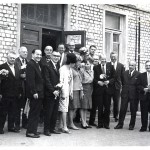
Soviet building Industry
We drove off to what had been a village called “Pircupir”. All that could be seen was a five or six acre field covered in long grass with garden flowers (mainly cornflower). It had been a flourishing village but a group of German soldiers came along and shot all the inhabitants, and then blew up all the houses. There was not an old woman, old man, housewife or child left alive. There were two buildings along the edge of the field, in which were photos of every person killed. They intended not to rebuild the village but find homes for the few survivors who were out at the time, working, shopping or in the armed forces. Our hosts were very emotional about Pircupir and everyone was very quiet, there was not a dry eye there. Why do things like this have to be, even in the name of War? We stayed in Vilna for two or three days and I got to know the locals very well and one in particular. His name was Vladimir Neckumov, he could speak good English. We continued to communicate when I got home but after about two years he failed to respond. I knew the Lithuanians were not very pleased to be part of the Soviet Union, so I imagined that the same restriction had been put on my friend. Lithuania, being one of the three countries on the Amber coast, they presented us with Amber ornaments and jewellery and it came through the Excise quite easily. They also gave me a jewellery box. It was jet black with inlaid pictures. The Excise asked me what it was made of. I didn’t know, neither did they so they just let me through. I’ve still got it and I still don’t know what its made of. We inspected another new building site and we asked to look inside one that was already occupied and at the third door knocked on we were invited in and even given tea by the occupiers, who seemed quite pleased to welcome us.
Next morning we flew off to Kiev, the capital city of Ukrain. I know we were in this part of the Soviet Union long before the nuclear disaster at Chenobel, but one can’t be writing about it now without a mention of the people of Rye who befriended some of the surviving victims. We only stayed here for a day, but we did a lot in the time, I learned a lot from them, in the way of common sense. As almost every thing will burn, all household rubbish in the city of Kiev, had to go to the common incinerator which was heating a giant public boiler which keeps a hot water supply going to all the houses. There is a paved promenade running along the side of the River Dnieper which runs through the town. The paving slabs are forming the top of a brick built duct. The sewer is at the bottom, then comes the gas and electric pipes and cables and on top of it are the cold and hot water pipes. The hot pipe prevents the paving from getting frozen or snowed up in the winter. Each paving slap gives access to all the services so they are not always digging up the roads. They just remove the nearest slab. Not everywhere in the USSR had this arrangement but in lots of places there was hot water piped. Vilna, Outside site offices at “Mikroravonas” housing Estate.Some of their sewerage was quite crude. There was an island in the middle of the River Dnieper which was being pumped out; and a new bridge was being built, we were driven round the new sites in the city and, of course looked at the old building in passing. They were administrative looking, and we were told that Kiev had played a great part in running Russia even before the USSR and there were those who were saying it was more Russian than Russia.
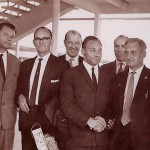
Soviet building Industry
As we went into a large restaurant in the city square, we saw an Austin Seven with a British licence parked outside. The Russian children hadn’t been used to seeing an Austin Seven so it was surrounded by children, just looking, not touching. Whilst eating our meal we heard a Welsh dialect, a few tables away. When we found them, they said they owned the Austin Seven. They had driven From South Wales to Kiev. They told us they had no trouble entering the Soviet union, but had had lots of trouble passing through other European countries. It was late at night when not only did the Russian frontier official welcome them but gave them a policeman to help find lodgings for the night.
Now it was off to an Airport and a flight to Kharkov, the second city of the Ukraine. Kharkov seemed to me to be more important than Kiev. To us it was more interesting in that it is an industrial town and evidence of hard work was everywhere. We met the city architect and the chairman of the city’s building trade union and it was he who stayed with us and showed us around but we didn’t find many faults in their new sites. Although they seemed to have many new public buildings we looked at the ‘misery rose’ that was placed on a plinth of a Lenin memorial every morning no one seemed to see it put there or who by. I keep talking of Lenin memorials. That’s because there were so many, but they did have war memorials and they had an eternal fire in front of them. We were given bunches of flowers everywhere we went, and we felt rather awkward carrying them about, so our leader, had an idea. He collected up all our flowers at the next memorial and made a ceremonial placing on it. Then we held breath and waited for the reaction of our hosts and they were delighted, so we did this all through our trip, and had been doing so, but I didn’t report it until my memory of the misery Kharkov rose made me think I should mention it.
The people of Kharkov seemed to be extremely interested in their children. There is a railway line operated entirely by children . We went to see it and we found children selling tickets. children porters, child guards and even children engineers and firemen.
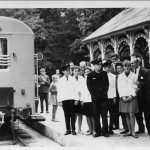
It didn’t matter if they were boy or girl, if they could do the job they did it. At that time they were miles ahead of us on sex equality. We were taken to visit a camp of young pioneers. (The equivalent of our boy scouts and girl guides).
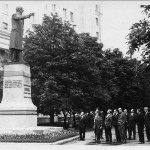
These children could all speak English and one of them asked me why Russian wasn’t taught in our schools as your second language. That was a nasty one, so I answered by saying that we were very near France so it made sense it was French. She then asked me where Boston was in England I could only handle this by drawing a rough map and putting a dot to identify Boston. She told us she had relatives there and would one day like to visit them. She would be a bit more than a middle aged woman now, and I wonder if she ever got to Boston. It would bevery nice, if she ever got to England, if she could have looked in on Rye. We met the Camp Commandant (a woman), and then we had to get on a stage, and take the salute of one pioneer after another and they presented us with one of their red triangle neck scarfs each. Young adults were also very much encouraged in that strips of garden were along the sides of the roads and young people were attending them. We were told that this was political policy, as the country belonged to them and they would not do any vandalism whilst taking pride in their gardens. A meal was then laid on for us and it lasted some four hours. It was common for these meals to be held. There were four courses and between courses there were cigarettes and slices of cold sturgeon and cucumber. Sturgeons were very tasty and there were plenty of them in Russia. Now it was off again and we went to the local airport where we were met by a young lady in a smart uniform. She shook hands and told us she was our pilot. Then she flew us safely into Simpheropolis in the middle of the Crimea. Before anybody asks, no we didn’t go to Stalingrad, or any of the volga area, nor did we go to Siberia. Teams from other countries were doing this. In Simpherolis we met the local building committee which was composed of five women and two men, it seemed to me that the two men stood little chance of getting their views over. “The Powers that be” wanted to take us to Yalta by helicopter, but decided the weather in the mountains was not safe, so we were taken by a fleet of taxis. On our way we were told our work in Russia was finished, and that we were now to have two days holiday in the builders holiday area of Yalta. As we speeded down through the middle of the Crimea, I expressed the thought that a hundred years before we wouldn’t have got on so well in that spot, but it wasn’t until afterwards that I knew Rye had a connection with the Crimean War. Sir George De Lacy Evans was an army officer at the Crimean conflict, and previously he had been M.P. for Rye in the days when the old town had two M.P.s. This was during the time of the rotten boroughs, of which Rye was one. This seems to support my previous opinion that an army officer from the Crimea came home and settled in Crimea cottage where Peasmarsh and established a tanning business there.
Yalta is a lovely place, and the trade unions own strips of beach, to which their members went for holidays and convalense after a serious illness. We were able to use the builders strip and it was beautiful and very warm, we were told it never rains in Yelta. Why did it never rain? Because it is surrounded by mountains, which send water down to supply the city with water, which is in a valley on three sides and the sea on the other, there was no wonder the three World War leaders chose Yalta as the meeting place to decide what to do with German leaders and it was exciting to sit on the seat where Roosevelt, Stalin and Churchill sat for this purpose. It is a famous tourist visiting place now. It is on the Black Sea which is so called because of the black pebbles. The water is very clear and one can see one’s whole body if standing in the sea and looking down. We worked our report here whilst lounging in the sun and going in and out of the sea. The interpreter had been coming in and out of my room all the trip, asking me to explain some English words and when I said “Why me?” he said “I was the only one he could understand”, so what about that for the Sussex and particularly Rye dialect? Now it was back to Moscow to hand in our report, say goodbye to our hosts and board a plane back to London. It was a British plane so we were able to have our first decent cup of tea for a fortnight as the Russians didn’t make very good tea. When we set down at Heathrow, the media were out in full force, but not for us, we had travelled home with Mrs Blunt, the wife of the famous spy who was in a Moscow prison and she had been allowed to visit him. We now had to pay for our adventure by reporting to our own various branches. The next year the Russians sent a team of building workers here, but the nearest they got to Rye was Kingston-on- Thames, so I went there to present their still working bricklayer with them, a British trowel, as I had been presented with one of theirs whilst in Leningrad.
The fact that they did visit us when we no come to help us, and as one thinks about it we couldn’t find much fault. Their luxury buildings and their use of sheet gold together carving of statues convinces me that their real reasons was an attempt to ease the cold war and open the iron curtain .
Rye’s Own July 2008
All articles, photographs and drawings on this web site are World Copyright Protected. No reproduction for publication without prior arrangement
